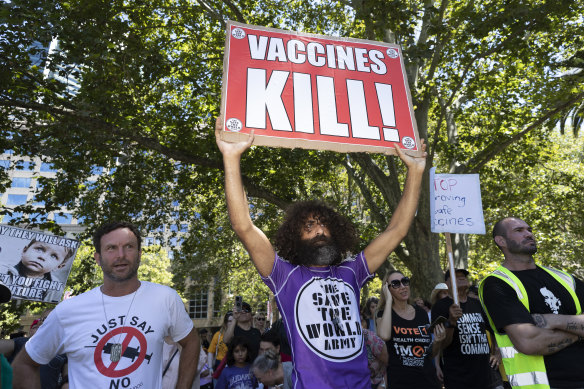Meet the cranky uncle ‘vaccinating’ people against conspiracies
Liberal Senator Gerard Rennick recently drew the attention of the world’s leading climate scientists on Twitter by insisting gravity was an ignored cause of climate change and claiming “CO2 is a gas, it cannot trap convection”.
Presidential Distinguished Professor Michael E. Mann patiently explained how Rennick had his physics wrong. But the senator, who has previously accused the Bureau of Meteorology of falsifying records to “perpetuate global warming hysteria”, only doubled down on his theories.

Dr John Cook’s “Cranky Uncle” game teaches people to identify the ways in which conspiracy theories and misinformation spread.Credit: crankyuncle.com
“This debunks the notion that communicating facts to climate deniers will change their minds,” Dr John Cook, a University of Melbourne researcher who developed a game called Cranky Uncle that teaches people to fight misinformation, tweeted in response to the fracas.
Cook’s observation is backed up by a new review of 25 studies into counteracting conspiratorial thought and scepticism towards science. The University of Cork review found that “traditional fact-checking and counterarguments are the least effective means of combating conspiracy beliefs”.
But if facts don’t work, how can we counter scientific distrust and flawed physics lessons on Twitter? The solution, said Cook, is much like handling a virus.
‘Fact-based inoculation’
Prevention is far more potent than treatment for tackling misinformation’s spread.
The review found that every study that trialled “fact-based inoculation” – a kind of information vaccine where people are primed to spot misinformation before they are exposed to it – significantly reduced conspiratorial thinking in the people who took part.
“The idea is taking the metaphor of vaccination and applying it to knowledge, or misinformation,” Cook, co-author of free online resource The Conspiracy Theory Handbook, said.
“With inoculation theory, psychologists have found that if you expose people to a weakened version of misinformation, that builds up their cognitive immunity – so that when they encounter actual misinformation, they’re less likely to get misled.”

Protesters at a Sydney anti-vaccination rally in 2021.Credit: Brook Mitchell/Getty
As a way of administering this “information inoculation”, Cook developed a game called Cranky Uncle that teaches people to recognise the methods bad actors use to spread misinformation.
As the Cranky Uncle character spouts ill-informed opinions on health and climate change, players bust the red herrings, misleading anecdotes and cherry-picked facts the uncle uses to make his claims.
Cook, who is a co-author of The Conspiracy Theory Handbook, is working on a version of the game that tackles anti-vaccination sentiment and aims to roll it out in East Africa, where vaccine hesitancy has become a major obstacle to public health.
Why people believe conspiracy theories
The authors of the recent review confirmed what conspiracy theory researchers had known for a while: trying to correct a conspiracy theorists’ argument with facts is one of the least effective strategies.
La Trobe University social psychologist Dr Mathew Marques focused on why people buy into conspiracy theories in the first place. People who feel powerless, uncertain or isolated are at most risk, he said.
“What motivates people to believe in conspiracy theories, is not necessarily being ‘right’,” Marques said.
“Just giving people new facts, or telling people they’re wrong, is probably the wrong approach to start with. Our approach is really trying to understand what needs are being frustrated in their lives. There might be a need for safety and certainty. They might feel powerless.”
That’s why experts advise a focus on empowerment and empathy when engaging with conspiracy theorists.
How to speak to a conspiracy theorist
“Firstly, ridiculing people is never going to change their minds, so making them feel stupid is not a good strategy,” Cook said.
“Secondly, approaching the conversation with empathy and genuinely trying to understand where they’re coming from is a good strategy.”
Tips for talking to a conspiracy theorist
- Show empathy and seek to build understanding with the other party, urges Professor John Cook in The Conspiracy Theory Handbook.
- Affirm the value of critical thinking, but redirect critical analysis to the conspiracy theory at hand.
- Draw on examples and messages from “exiters” – people who have previously believed in conspiracies such as QAnon but gave up on the beliefs.
- Ridiculing a theory or aggressively attempting to “win” the argument with facts is unlikely to work.
Encouraging a conspiracy theorist to turn their critical thinking skills on their own theories and consider messages from “exiters” – conspiracy theorists who have given up their convictions – can be more effective and long-lasting interventions than attempting to debunk beliefs with facts.
As an example of how this advice has been applied, Marques created guidelines for health workers for communicating with people who harbour COVID-related conspiracy theories.
The guidelines focus on affirming the patient’s critical thinking (“We likely both agree that asking questions is important, but it is key we evaluate all pieces of evidence”); restoring their sense of personal control (“Your voice matters”); and highlighting the fact that conspiracy theories are not as commonplace as they might assume (“Our community is overwhelmingly getting vaccinated”).
It’s not impossible to shift someone’s view. But both experts emphasised that it’s incredibly difficult to convince conspiracy theorists to give up their beliefs.
“You’re probably better targeting the vast majority of the public who are at least open to evidence, but also vulnerable to misinformation,” Cook said.
Enjoyed this article? The Examine newsletter explains and analyses science with a rigorous focus on the evidence. Sign up to get it each week.
Most Viewed in National
This article has been archived for your research. The original version from Sydney Morning Herald can be found here.


